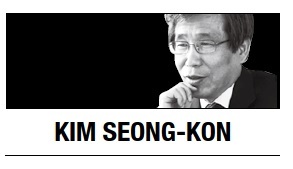
I have just returned from a trip to Paris, where South Korea was invited as the guest of honor country at the 2016 Paris International Book Fair.
I traveled with 30 Korean writers to the book fair for a series of literary events. Anne Hidalgo, the mayor of Paris, hosted a welcoming reception for us and French President Francois Hollande visited the Korean Pavilion to pay his respects to the guest of honor country, as did the French minister of culture.
The 30 Korean writers enjoyed enormous popularity at the book fair. For example, Hwang Sok-yong and Kim Young-ha’s events turned out to be standing room only, despite being held in a huge auditorium. The French press, including Le Monde, praised the idiosyncrasy of Korean literature, which they said emitted the exotic fragrance of Eastern culture.
This was my third visit to Paris. I first visited Paris briefly when I was a British Council scholar at the University of Oxford in 1991. Then in 2003, I went back to Paris to give a talk at the University of Paris XIII. Roaming the streets of Paris in 2016, I found myself still in awe of this marvelous city that was full of cultural heritage and literary monuments. Paris was the city of Appolinaire’s “Le Pont Mirabeau” that begins, “Under the Mirabeau Bridge there flows the Seine/ Must I recall/ Our loves recall how then/ After each sorrow joy came back again.” Strolling down on Pont Neuf, I recalled the famous movie “Les Amants du Pont-Neuf” that fascinated Korean moviegoers when it was released in Korea. I also reminisced on the mesmerizing French chansons I used to sing in my college years, such as “Sous les Ponts de Paris” and “Sous le Ciel de Paris” sung by Juliette Greco and Yves Montand respectively.
This time, however, I found something else in Paris. I saw that both the past and the present peacefully coexist in Paris. For example, in Paris you can find numerous historic monuments such as Notre Dame Cathedral, the Arc de Triomphe and the Louvre. At the same time, you can also find futuristic icons such as the ultramodern Montparnasse Tower. Even the Eiffel Tower, which was built in 1889, could be a symbol of reconciliation of the past and the present, with its elevators and restaurants. Likewise, in the subway, I could see many people reading paper books and newspapers, while others browsed through them on their smart devices. Indeed, Paris is a city where the past and the present are not mutually exclusive, but embrace each other affectionately.
Boarding my flight to return to Seoul, I brooded over the differences between Seoul and Paris. I realized that Seoul suffers from a rupture between the past and the present. For example, our classical literature, which was written in classical Chinese, is different in every respect from modern Korean literature written in the Korean language. As a result, most Koreans cannot read their classical literature without translation.
Unlike France, in Korea, the past is always a burden that weighs heavily on your shoulders. Many Koreans are still obsessed with the past and haunted by dark memories. Politicians and political activists frequently use the past as a weapon to wound their political foes. That is why leftist educators are distributing in schools encyclopedias of Korean collaborators during the Japanese occupation. And that is why left-wing and right-wing historians antagonize each other in Korea. For us, history, as Stephen Dedalus says in “Ulysses,” is a nightmare from which we try to awake.
However, if we cannot overcome our dark past, we will never be able to soar into the future. F. Scott Fitzgerald’s “Babylon Revisited” well illustrates this. In the story, the protagonist Charles is ruined because he cannot completely sever himself from his past nightmares. While living in Paris in the past, Charles was associated with promiscuous people and led a dissipated life, which drove his wife to her death. Consequently, Charles was deprived of his parental rights for his beloved daughter, Honoria.
Now living in Prague in regret, Charles becomes sober and returns to Paris to reclaim his daughter. Alas! He encounters his old gang and stumbles into the nightmare of his past. Once again, he is denied his custodial rights and leaves Paris in remorse. He knows this will be the last time he sees Paris, because Honoria will not need a father when she becomes a teenage girl. For Charles, losing his daughter means losing his future. This novella was made into a film whose title was appropriately “The Last Time I Saw Paris.”
If we continue to be obsessed with our dark past, we, too, will end up losing our future. We should get over the past and focus on the future instead. It occurred to me that perhaps this would be the last time I saw Paris. Leaving Paris for Seoul, I intensely wished we could achieve harmony between the past and the present to open up a bright future.
By Kim Seong-kon
Kim Seong-kon is a professor emeritus of English at Seoul National University and the president of the Literature Translation Institute of Korea. — Ed.

